當前位置: Language Tips> 雙語新聞
最近,一群精英家長競選家委會的簡歷“暴擊”了無數人。
幾張微信群截圖充分展現了上海浦外附小家委會的競選“盛況”。
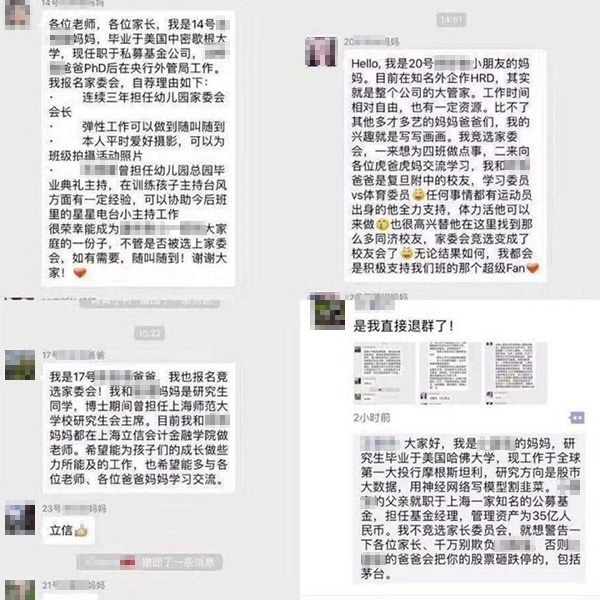
In the speeches, the parents boast of their expensive educations at prestigious universities, of their good jobs, and of their qualifications as ideal role models for children.
家長們在競選宣言中炫耀自己優越的名校教育背景、體面的工作、以及作為學生心中完美榜樣的資格。
“I graduated from Central Michigan University, and now I work at a private equity firm,” wrote one mother, adding that her husband, a Ph.D., works at the State Administration of Foreign Exchange.
其中一位媽媽寫道:“我畢業于美國中密歇根大學,現任職于私募基金公司。”她還稱,自己的丈夫博士畢業,在央行外管局工作。
She enumerated several reasons why she believed herself to be a strong candidate.
這位媽媽還列舉了幾個理由,證明自己是一位強有力的候選人:
“I have three years of experience as the head of the parents’ committee at my child’s kindergarten; my work schedule is flexible, so I can be present whenever I’m needed; and I’m a fan of photography, so I can take pictures during class activities; and my child was the host of her kindergarten’s graduation ceremony, so I have experience in training children to host.”
“連續三年擔任幼兒園家委會會長;彈性工作可以隨叫隨到;愛好攝影可以為班級拍攝活動照片;XXX曾擔任幼兒園畢業典禮主持,在訓練孩子主持臺風方面有一定經驗……”
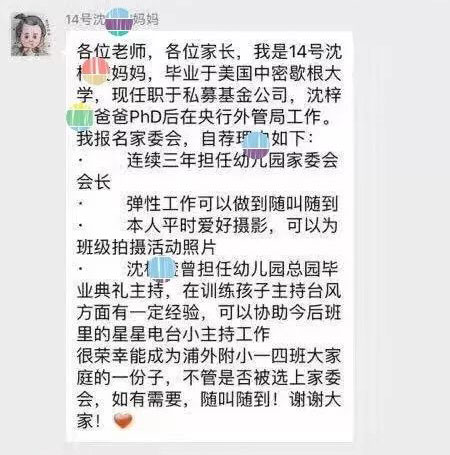
Along with the first ambitious candidate, another two parents joined in the contest.
除了第一位雄心勃勃的候選人之外,還有兩位家長參加了這次競選。
“I was president of the graduate students’ union when I was pursuing my Ph.D.,” wrote one father, added that he and his wife were teachers at a university that specialized in finance and accounting.
一位爸爸寫道:“博士期間我曾擔任學生會主席。”他還表示,自己和妻子都在上海某金融會計學院做老師。
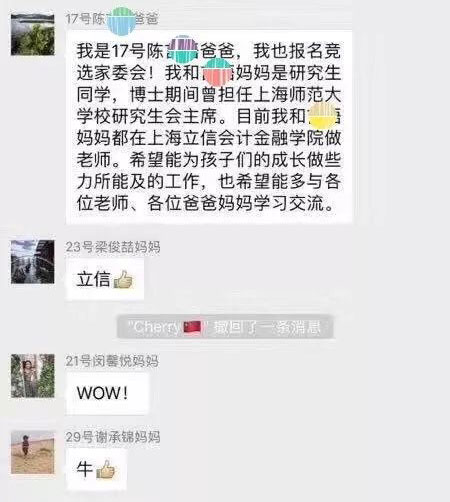
另一位參加競選的媽媽也“低調”秀出實力,她表示,自己作為某知名外企的人力資源總監,工作時間相對自由,有一定資源:
“I’m far less capable than these other multitalented parents — I’m only interested in painting and writing,” she wrote. “And it’s so nice to see so many Tongji University alumni [in this group].”
“比不了其他多才多藝的爸爸媽媽,我的興趣就是寫寫畫畫……很高興在這里找到這么多同濟校友。”
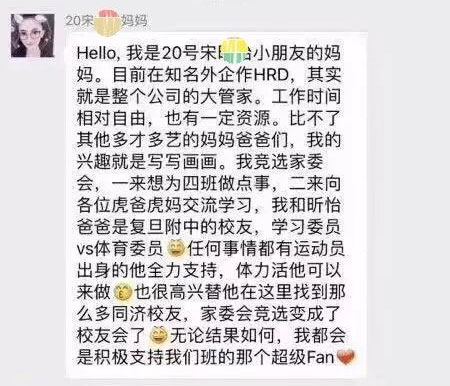
為了競選上家委會成員,家長們紛紛亮出了自己“高大上到讓人懷疑人生”的履歷:學歷動不動就是名校碩士、博士,就職于政府機關、知名外企等讓人艷羨的機構。
看完這個家長群的競選發言,一波吃瓜群眾坐不住了。有人批評這樣的“炫富”太過分,并模仿競選發言調侃一番:
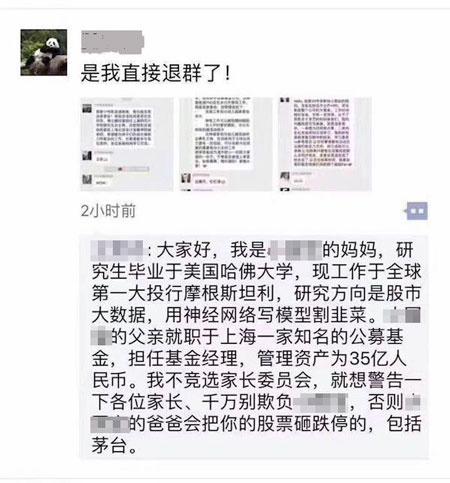
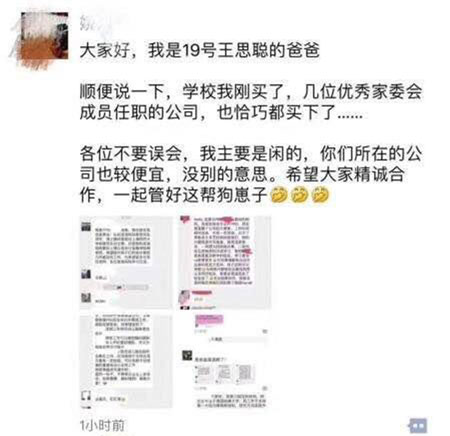

也有人自嘲,“對不起未來的孩子”、“嚇得連孩子都不敢生了”。


事實上,如此競選家委會的學校不止上述一所,杭州某小學校家委會候選人的履歷同樣讓人震驚。
Earlier last week, users on microblog platform Weibo shared similar accounts, purportedly from a primary school in Hangzhou. A brochure had printed a long list of PTA candidates, most of whom claimed to have graduated from prestigious universities and to work in lucrative jobs.
上周早些時候,有網友在微博上曬出了類似的內容,據稱是來自杭州某小學。一本小冊子上印著長長一串家委會候選人名單,其中大部分人聲稱他們畢業于知名學府,有一份高薪工作。
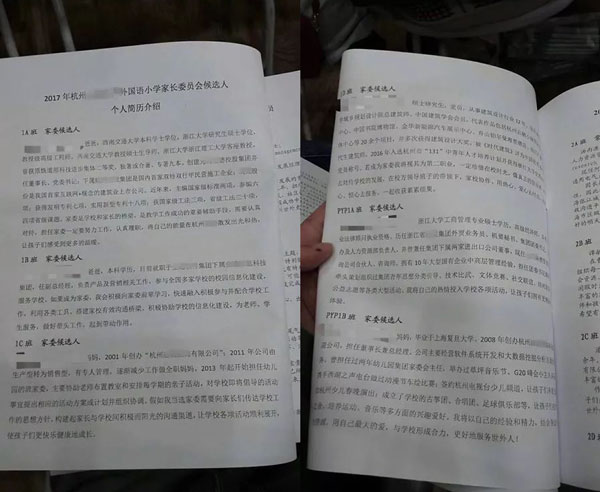
家委會對于現在的學生家長并不新鮮,很多學校都會在每年新生入學時選舉家委會成員。
家委會主要承擔的職責包括向家長溝通班級學生情況,形成維護班集體的向上氛圍,提高班級凝聚力,對班級建設發揮建設性作用。具體來講,比如: 協助老師舉辦活動;為新生家長提供幫助,讓他們的孩子盡快融入校園生活;籌措必要的活動經費,對經費的使用進行管理和監督,實行財務公開等等。
競選家委會無可厚非,但像上述兩所學校這種拼學歷、比工作、炫資源的競選方式,已經走形變味了。
One article compared the apparent intensity of primary school PTA elections to that of the US president election. Some net users lamented that the posts underscored the fact that fierce competition among children now extended to their parents, too.
一篇文章將小學家委會競選的激烈程度與美國總統選舉相提并論。有網友感嘆,這些帖子強調了一個事實,即學生之間激烈的競爭已經到了拼家長的程度。

Though China’s education system has in recent years advocated a so-called happy education policy to relieve the heavy workload facing students, some parents and schools still put more stock in rankings and enrollment rates.
盡管近年來中國的教育制度一直在提倡為學生減負的快樂教育政策,但有些家長和學校對名次和升學率仍然執迷不悟。
In May, Shanghai’s education bureau ordered two private primary schools to apologize for asking parents of prospective students to take intelligence tests, and for interviewing them about their own parents’ professions and educational backgrounds.
今年5月,上海市教育局命令兩所私立小學道歉,原因是他們要求學生家長參加智力測試,并對家長的職業和教育背景進行調查。
A woman surnamed Wu, the mother of a 7-year-old, told Sixth Tone that because teachers at international schools are not allowed to receive gifts from parents, this made it harder to establish close relations. “A PTA member will get to collaborate with the class head and the other teachers frequently,” she explained, “and this can allow you to get closer to them.”
吳女士的孩子今年7歲了,她告訴第六聲網站,由于國際學校禁止老師收禮,因此想和老師建立密切關系就更難了。“家委會成員可以和班主任以及其他老師經常聯系。這樣可以和他們走得更近。”

據上海某公立學校班主任徐老師介紹,和吳女士一樣,大部分家長也都是懷著跟老師、校長套近乎的心理來當這個家委的:
“Becoming a PTA member means you’ll have more chances to keep in touch with teachers, and this might benefit your child’s performance somehow.”
“成為家委會成員,意味著你有更多的機會與老師保持聯系,這可能會有利于孩子的表現。”
Though Wu believes the screenshots circulated online are borderline pathological, she said that PTAs at international schools provide a communication channel for parents to make their voices heard and share their opinions. “The system is quite good,” she added.
雖然吳女士認為,網上流傳的這些截圖已經接近病態了,但她說,國際學校的家委會為家長提供了表達意見和溝通交流的渠道,“這樣的制度很不錯”。
英文來源:Sixthtone.com
翻譯&編輯:董靜
審校:yaning
上一篇 : 修辭三要素成約會神助攻
下一篇 :
關注和訂閱

電話:8610-84883645
傳真:8610-84883500
Email: languagetips@chinadaily.com.cn